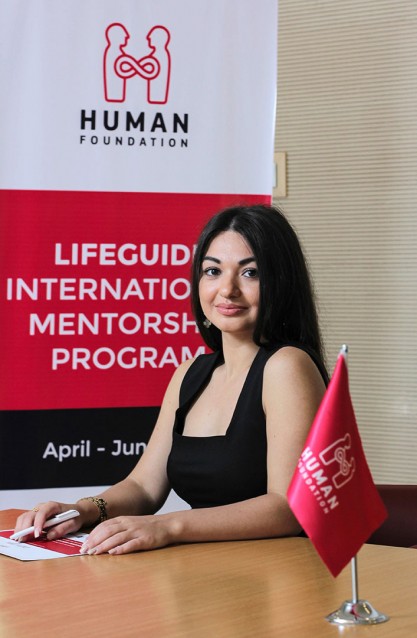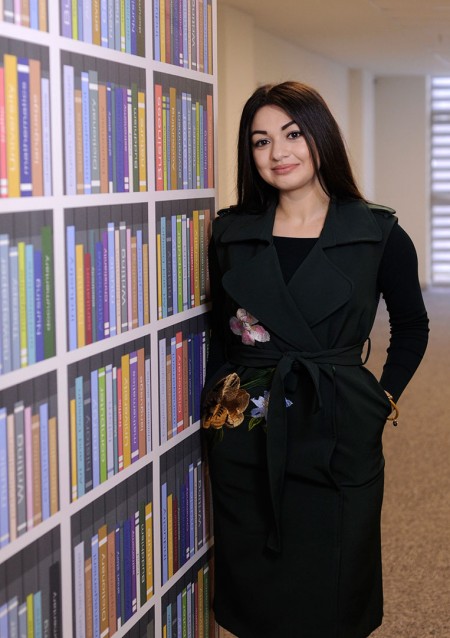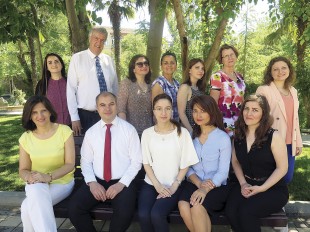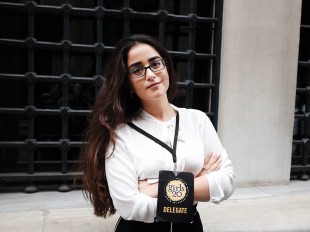Bakuvians often say, our Baku is such a small city. Only recently have I begun to notice what they really mean when they characterize our city as small. There is a certain kind of people by which, I have to admit, I’m quite fascinated – wherever they go, they seem to know everyone and their presence immediately lights up the room.
Such is Farida Asgarzade, inevitably greeting several acquaintances even in the smallest cafes; and quite honestly, it’s impossible not to be fascinated by the incredible projects she constantly initiates in Azerbaijan. Being one of the country’s most promising young social entrepreneurs, Farida is the founder of HUMAN Foundation (HF), which is a union and a social platform for people of all races and backgrounds promoting exchange of knowledge, skills, and abilities – all in the name of a more fair and equal society.
Farida’s unplanned but very successful journey into social entrepreneurship started unusually with... music. Ever since she was five, Farida was an aspiring piano and organ player practising for seven to eight hours per day. With all that discipline and practice, very soon her musical career started picking up pace; she became an international laureate and gave numerous solo concerts, until one day she had a change of heart.
Music as well as art is a reflection, it cannot be a profession that requires a diploma. To be limited in art or music seemed contradictory to their purpose, so she pursued her interest in international relations. Farida had always been interested in politics as a child, cutting out newspaper articles, taking notes and watching the news, because she truly believed that she could change the world.
The world, of course, was not that easy to change. After studying politics for four years, she knew it would take more than one person to initiate that change. But I also learned that it doesn’t have to be on a large scale at once; if you only help one person and that changes their world – this philosophy inspired me.
Maybe that’s why she decided to ultimately become a teacher, to plant this seed, to change the way the younger generation perceives this world, so that in the future they could apply the same philosophy in their own spheres.
Her inclination to help others also comes from her grandmother, whom people say she resembles a lot. Every summer, at their country house, her grandmother organized makeshift classes where she and Farida helped local kids to learn how to read and write. Seven or eight of those kids went to school at her grandma’s initiative and years later were thanking her for changing their lives, for this gave them a chance at gaining better employment. After her grandmother passed away, Farida was determined to continue her legacy. She always taught me that the most important value is human dignity, not money. And how important education is for society and the development of a country.
Human Foundation
Although Farida’s shining personality gained her the nickname sunny when she was a child, her whole outlook on life changed six years ago when she first started the social activities of HF. Every morning from then on she has started with a grateful heart and a belief that something wonderful is absolutely going to happen that day.
When you think about how we take small things for granted and how those same things could be daily challenges for others you start appreciating your very full life. And I will never say that the physical limitations make those people unhappy – on the contrary, they became an example for me in how they find alternative ways of achieving their dreams and being happier than before.
Inspired and driven by a wish to share that feeling with more people, Farida started a journey to build a platform for people with disabilities to share their success stories. In the course of seven to eight months travelling around Azerbaijan, she found and wrote about some of the bravest people she knew and built her network daily. However, at some point just writing those incredible, but not widely read, stories started to feel like it was not enough.
The more people she met and the more discussions she had, both in Azerbaijan and during international conferences abroad, the more rapidly her mind began to erase the pre-existing borders between people. All that differentiates us is our character; the rest – skin colour, religion, nationality, interests – none of it matters, we all are one.
And precisely the exclusion of any sort of division became a defining quality of this novel foundation – neither a woman-only platform nor a charity, since both also imply division. The foundation unites all people with all their differences and functions by the principle of sharing, be it information, resources, knowledge, time or just simple support. That allowed the foundation to start organizing inclusive events – seminars, speeches and trainings – without any budget whatsoever – all with the help of the like-minded people around her dividing up roles, each helping with what they could.
No matter how different we may seem to be, we are all human
The very first HF project was called You Can and took place in November 2016. It consisted of five TEDx-style speeches by people with disabilities who have achieved great success despite their limitations. Through those speeches I wanted to share how I myself was inspired by the bravery of my friends when they became disabled. She explains that it is quite a different experience for those who get disabilities later in life. The life they knew changed in a nanosecond. Adapting to that, not succumbing to dark thoughts of suicide – that requires some major willpower which seeing in those people changes you.
From the very first You Can event, held with the support of YARAT, the speeches were an absolute success with attendees from all sorts of organizations and universities. Once, after the event, Farida accidentally overheard two men talking, one of them slightly ashamed to admit, Man, I can never find time to go to just regular English courses, but look what these people do. These small comments helped and inspired her to do even more.
This year the inspirational speeches are presented in universities in Azerbaijan and abroad for the first time, to reach students there as well. A thought is a seed that you can plant in the minds of one of the most powerful segments of society, students, and watch it bloom into extraordinary results. I want it to be a wake up call for them, a refreshing look at all the opportunities available to us if only we could overcome our inertia.
She loves working with students. Two years ago when she was offered a job teaching economic diplomacy at Baku State University, Farida accepted without thinking. She learned quite early in her career as a teacher that students have a perception that they are completely uninteresting to their teachers, as though they are just participants in the system.
I wanted them to know that I care for each one of them and that is the sole reason I chose that job.
Despite her soft appearance, Farida is a very strict and demanding mentor. In those short two years, she has taught over 600 students, taking more than the normal minimum amount of classes. I care for each one of them and that is precisely why I am so demanding of them. This is a balance I had to learn.
Her ideas for education and society are endless. One of her recent endeavours was to help students apply for the Hult Prize, the world’s largest student competition for social good, with Azerbaijani students participating for the very first time. But, surprisingly, the most challenging part was not the project itself but the lack of confidence in the students.
There are teachers that would straight out demotivate students, whereas I go back to the best teachers I had and how they inspired and motivated me personally, one good example being my mentor, Mr Bakhtiyar Aslanbayli, a current vice-president of BP Azerbaijan.
Human Foundation is a union and a social platform for people of all races and backgrounds promoting the exchange of knowledge, skills and abilities – all in the name of a more fair and equal society
HF has also been a platform for various projects to develop human capital, creating opportunities for all members of community. To name just a few, the Life Guide International Mentorship Programme allows students a chance to connect with successful CEOs through mentorships; Human Deaf Community created the first in Azerbaijan sign language interpretation of Azerbaijani film; and Human Interfaith hosted the first World Interfaith Harmony Week in Azerbaijan.
Another project HF organizes is a six-week Development and Empowerment Programme for teenage girls in Baku, Buzovna and Sumqayit taught by local and foreign trainers in collaboration with AIESEC, a global youth NGO. In the first iteration of the programme, more than 75 initially shy participants learned so much about education, organizational and learning skills that by week six they were actively discussing study abroad programmes and university education, and some were even singing. The trainers also visited Azerbaijani settlements in Kakheti, Georgia, to conduct a workshop on the topic of early marriages.
Even though this programme was for girls, Farida emphasizes that gender equality was not a central theme. She is a strong believer that gender equality should be taught simultaneously to girls and boys, so that both genders accept the idea as opposed to empowering women separately and leaving men in a chaotic state of confusion. Now the foundation is developing continuous social trainings for boys and girls in the regions, because this is the time when you can help form their mindset. In her view, the ideology and mentality of people can be transformed at an early age through books. With the help of fellow writers, Farida is now in the process of creating a Human Books series with stories teaching about the equality of all people.
Currently in the process of developing is a long-term peer-to-peer educational program aimed at empowering young volunteer mentors to support children in reaching their potential.
“We are all entrepreneurs”
An enormous inspiration and motivation for Farida was her participation in the One Young World Summit in 2016 in Canada. At this summit, for which she won a scholarship, 1,300 like-minded entrepreneurs from all over the world convened and discussed ideas and projects implemented in their countries. Hearing speeches by Justin Trudeau, Kofi Annan, Emma Watson, and being validated for her small but important project had an incredible impact on her personally. You have to start believing in yourself so others will too. Not surprisingly, Human Foundation was among the 50 projects selected to be featured in One Young World Annual Impact Report 2017.
One pivotal influencer at the summit was a Nobel Peace Prize laureate, Muhammad Yunus, the founder of the social business concept, a new movement aimed at connecting society to business whereby, while making money, people also help a social mission. He announced that within a year a branch of the YUNUS Social Business Centre would open at the Azerbaijan State University of Economics at the initiative of its rector, Mr Adalat Muradov. For years, before she even knew that this term existed, Farida had been pushing for social business to be implemented in Baku. Needless to say that a week later, she was at the university expressing her interest in the project, proving to be the perfect fit to run it.
As the current head of the YUNUS Social Business Centre UNEC, Farida comes up with creative projects to use the space as well as possible.
We need to introduce and explain the idea of social business to students from early on, teaching them that it’s possible to simultaneously make money and solve social issues. Helping small and medium businesses in the regions and in the centre is crucial for developing Azerbaijan. The goal of the centre is to create the initiative for the creation of the new economic model.
At her young age of 25, along with initiating projects not only in Azerbaijan, but effectively in Mexico, Italy, Belgium and the UK – Farida most certainly successfully implements the essence of social platform activities. She understands well the importance of her role as a mentor, preserving and welcoming the stream of consciousness in her classrooms; every day, she tries to instill in those young minds how to think instead of what to think and to trust the power of ideas.
Whether it is her personality or the enthusiasm and her heart, with which she talks about all her numerous and noble projects – her inspiration and positivity are infectious, leaving me unexpectedly drafting my very first book for the Human Books project.
Her grandmother would have been truly proud...




